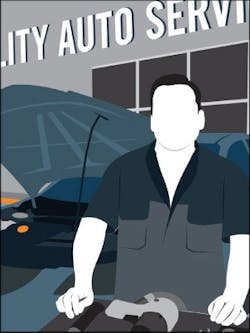You likely don’t need another person to remind you of it, Tim Ross says, but, just in case, he’ll say it again.
“Today’s industry is more competitive than ever; it’s no secret,” says Ross, the president of industry marketing firm Mudlick Mail. “That doesn’t mean that opportunity isn’t there. It’s just different, and we need to approach things differently.”
Vehicles are made better, which means fewer breakdowns and longer lifespans. That means the emphasis needs to be on creating long-term, loyal customers; quality over quantity, Ross says.
It also means finding new and different ways to attract and retain the right customers to your shop.
Some are subtle in their descriptions of the way industry marketing is heading. Others are more direct. Count former shop owner and longtime industry consultant Bill Haas in the latter group.
“The days of being able to compete based on price are gone,” Haas says. “Discounts might bring someone in the door once, but that’s not how you develop long-term customers that make your business profitable.”
Auto repair is a service, an experience; it’s not a commodity. For your shop to remain profitable (or to become profitable), price cannot be your main selling point to customers. A modern repair facility can not have a business model based on “being the cheapest,” Haas says. Today’s industry is about value.
What Women Want The automotive aftermarket has made great strides in recent years to make its offerings more appealing to women. But a study from AutoMD suggests that the efforts still fall far short. More than 44 percent of women who participated in a survey earlier this year said they have a “negative view” of the repair shop experience. The respondents ranked going to a shop or dealership for repairs as a less likable experience than going to the dentist. But what would change their minds? It wasn’t cost.“We need [a customer base] of people who shop on ‘How long?’, as in ‘How long will this repair make my car run for?’, rather than just ‘How much will it cost?’” Ross says. “That distinction is the difference between being successful and profitable in this industry, and not.”
Devaluing the Industry
Anecdotally, the proof is everywhere. The most successful companies in the auto service sector refuse to compete on price.
Ross points to his business partner at Mudlick Mail, Greg Sands, who owns and operates nearly 40 shops. There’s also Honest-1 Auto Care and Christian Brothers Automotive, two fast-growing national companies opening multiple locations each year—and doing so with incredible success rates.
None of them are playing a bidding war with price; they sell customers on value.
In the past year, even national discount chains like Pep Boys have taken their shots at creating a more rounded customer experience by improving lobbies, store fronts and overall customer service.
“This is the way the industry is heading,” says Maylan Newton of Educational Seminars Institute. “As an industry, we need to give customers what they desire and what they’re looking for.”
Both Newton and Haas point to numerous consumer habit surveys that definitively show that price is not the leading determining factor for customers (see “What Women Want” on the previous page for one example). In fact, it rarely ranks higher than fifth on a list often topped by quality of work, honesty, speed of the job and customer service.
“Customers will look at price as what the service is worth,” Newton says. “When you’re playing lowball on prices, you’re showing your work isn’t worth much. If it’s a discount, and you’re giving them a deal, how do you convince them later that they should now pay more for a service that, the last time, cost them a fraction of the price?
“When you discount, you’re devaluing your services, you’re devaluing your shop, and you’re devaluing the industry.”
As industry professionals, Haas says, shops are responsible for the work they do—they’re liable for that work.
“If you’re giving a discount, are you getting paid to take on the liability for that repair, or are you paying them (through the discount) to take on the liability?” Haas says.
‘Be the best option, not the cheapest’
Let’s make an important distinction: Marketing is to attract people to your shop, not to sell them jobs.
“What you’re doing anytime you send out a marketing piece is getting people to try your shop,” Ross says. “Then, it’s up to everything you do to sell them on who you are and keep them long-term.
“You’re going to close a certain amount of jobs and gain a certain percentage of the customers you bring in. What you need to do is give your team as many at-bats as possible.”
This is where many shops fall into a tailspin of discounting. A shop’s marketing needs to deliver “a compelling offer” to get customers to choose your shop over the one they’re currently loyal to, Ross says. But that doesn’t have to mean being cheaper.
“It can be inspections, it can be your warranty, your shuttle service, loaner cars, a time-based guarantee—whatever it is, it just needs to be compelling to make them try you,” he says. “It can’t be ‘We have a great couch, a TV and WiFi.’ No one is going to your shop to hang out. They’re going to get their cars looked at.”
Present your business how you want it to be seen by customers, and to the type of customers you want to gain; again, it’s those asking “How long?”
“The bottom line is that we need to be building businesses based on our numbers, businesses that allow us to be profitable,” Haas says. “We can’t provide quality service, quality work and get things done in a timely manner if we’re cutting costs. We have to be the best option, not the cheapest.”



